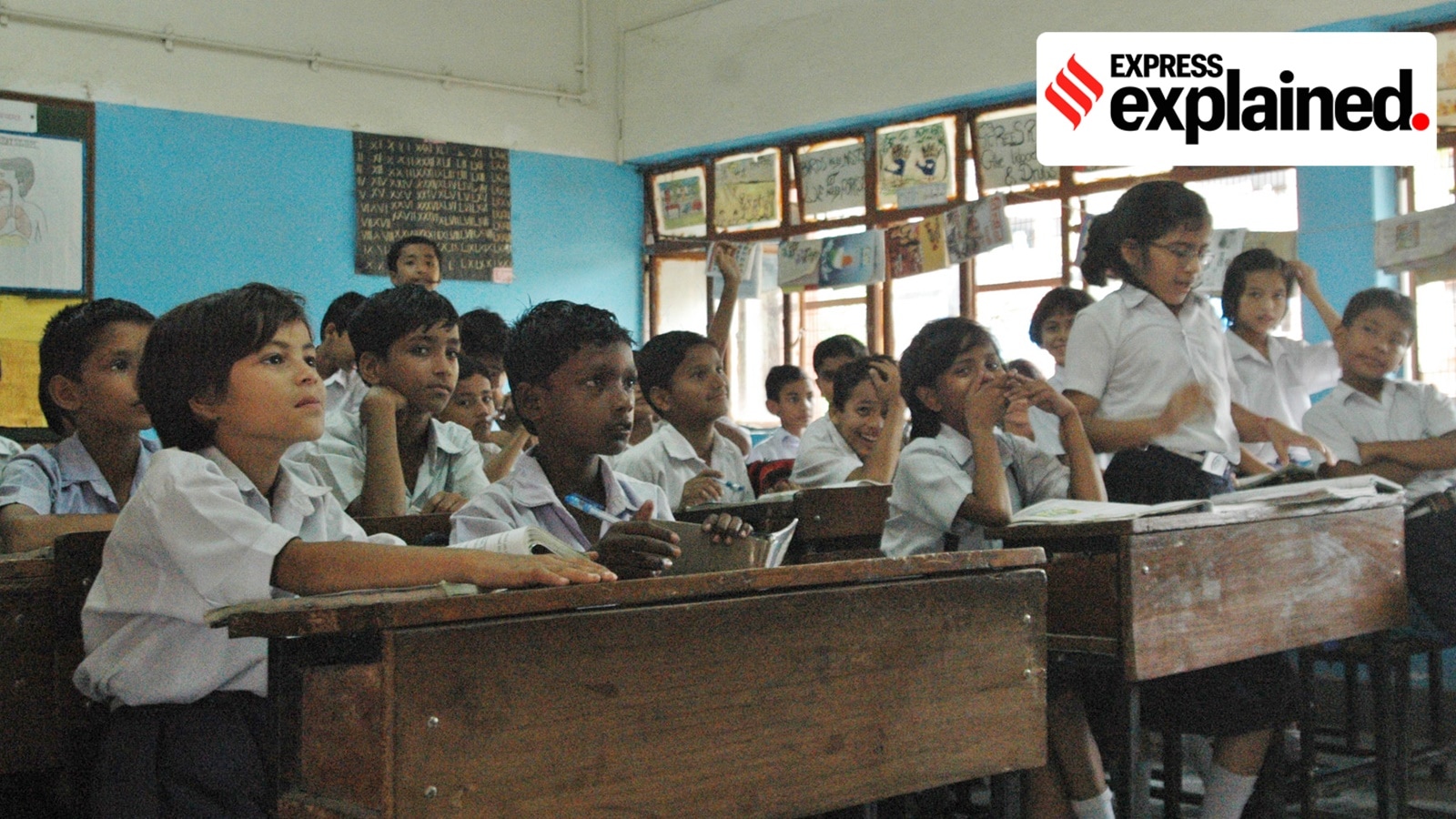Explained: The ‘no-detention’ policy for students of Classes 5 and 8, why it has been contentious
The ‘no-detention’ policy, a part of the Right to Education Act, has been a source of debate recently. We explain the rationale behind its introduction and why some later argued for its removal.
 In 2023-24, the first academic year in which Delhi scrapped 'no-detention', close to 20% of Class 8 students who appeared for their exams failed. (Express archives)
In 2023-24, the first academic year in which Delhi scrapped 'no-detention', close to 20% of Class 8 students who appeared for their exams failed. (Express archives)The Ministry of Education recently allowed students in Classes 5 and 8 in around 3,000 central schools, including Kendriya Vidyalayas and Jawahar Navodaya Vidyalayas, to be held back if they fail to clear examinations.
If the student does not pass the exam in the first instance, she will be given a shot at a re-exam within two months. Failing to clear that will result in the student being held back in that class.
The Centre’s decision comes five years after it amended the Right to Education Act, allowing the states and the Centre to take a call on detaining students in Classes 5 and 8. Since then, some states have chosen to scrap it. We explain.
What was the ‘no-detention’ policy and why was it introduced?
The Right of Children to Free and Compulsory Education (RTE) Act of 2009 was meant to provide free and compulsory education to all children aged 6 to 14. Section 16 of the Act prohibited holding back or expelling a child. It said: “No child admitted in a school shall be held back in any class or expelled from school till the completion of elementary education,” meaning till Class 8.
The rationale was that repeating a class could be demotivating for a child and result in her dropping out. The ‘no-detention’ aspect was meant to ensure that a student completes at least elementary education without abandoning school. It also factored in the possibility that a student may have failed an exam because of inadequacies in the education system.
Key to this concept was the ‘continuous and comprehensive evaluation’ (CCE) at the elementary level. It meant a student’s understanding and application of knowledge would be assessed through continuous evaluation. The Act also added that no child shall be required to pass any board examination until completion of elementary education.
Why was the RTE amended?
A Bill to amend the RTE Act was introduced in the Lok Sabha in 2017, replacing section 16 with a section that specified there would be a regular examination at the end of the academic year in Classes 5 and 8. If the child fails the exam, they will be given additional instruction and a re-exam within two months. Failing this, the “appropriate government” may allow schools to hold the child back. States and the Centre would decide on holding back students in schools under their purview.
When the amendment Bill was introduced in Parliament, the statement of objects and reasons read that section 16 of the Act was “not showing healthy results.” “It is seen that children are routinely being promoted from one class to the higher one without any linkage to the learning they have attained. There are instances where the children’s attendance has been very less and consequently, they were not able to learn meaningfully. This defeats the purposes of the Act,” it read.
The Bill was referred to a standing committee that recommended removing the no-detention policy. It was then passed in 2019.
What were the arguments for and against no-detention?
In 2012, the Central Advisory Board of Education (CABE), the highest education advisory body, constituted a sub-committee to examine the implementation of CCE in the context of the no-detention provision. Headed by then Haryana Education Minister Geeta Bhukkal, the sub-committee called for “more flexibility” in the no-detention system, meaning it should allow for detaining students who are “lagging behind”.
Its report pointed to two “key trends” in the quality of education in government schools. Based on data from the NGO Pratham’s Annual Status of Education Report, it found “declining learning levels”. There was a 10 percentage point drop from 2010 to 2013 in standard 5 students who could read a standard 2 text in government schools in rural areas. It also noted “migration towards private schools.”
It identified “root causes” for the declining learning levels, including “lack of assessments”. It said while the ‘no detention’ clause is trying to achieve laudable objectives such as inclusiveness, minimising the dropout rates and removing the fear of failure among students, it is often misinterpreted in schools as “no assessments” or “no relevance of assessment”. Further, it pointed to low student motivation as the “general message is that ‘performance does not matter’”, and “low teacher accountability.”
Not everybody on the sub-committee concurred. Some argued that there was no evidence to show detention enables learning. Prof. Nargis Panchpakesan noted that “the child is failing because of the system” and “that most of the children presently going to government schools are from marginalised groups and will be affected under detention policy.” There was no comparative study to point to learning achievements before and after the no-detention policy was introduced, she added.
In 2015, the sub-committee report was submitted to the CABE, which then asked states/UTs to share their views. Of the 23 States/UTs which did, 18 suggested the policy be modified. States like Madhya Pradesh and Punjab suggested that board exams be introduced in Classes 5 and 8 since no detention “has an adverse impact on academic performance”.
A few states like Karnataka and Andhra Pradesh said that the no-detention policy should continue to ensure a minimum of eight years of school education and that otherwise, the dropout rate would increase. They recommended strengthening the CCE system instead.
In 2016, the CABE passed a resolution for scrapping the policy, concluding it meant that students were not being serious about their studies.
Meanwhile, in 2016, the TSR Subramanian committee submitted a report on the New Education Policy 2016, which said that the no-detention policy should be continued but only till Class 5.
The committee said, “no-detention policy has resulted in a fall in the drop-out rates in elementary school and has kept children in the learning cycle for 8 years. A comparison of the CBSE and other State Boards’ results for class 10 and class 12 for the years 2009, 2012 and 2013, shows that the pass percentage has increased in respect of most of the States…this empirically validates the utility of the no-detention policy. Empirically, there has been a steady rise in the GER (gross enrollment ratio) at the elementary level, for both boys and girls, as well as for Scheduled Castes, Tribes and other marginalised sections since the coming into effect of the no-detention policy. In a deeply fragmented society such as India, this is a significant gain which should not be reversed.”
When the Parliamentary Standing Committee that considered the RTE Amendment Bill called for suggestions, arguments they received against scrapping no-detention included the lack of evidence that the policy itself had caused a decline in learning outcomes, which can also be attributed to other aspects like infrastructure in schools and teaching.
What states/UTs retain the no-detention policy?
Andhra Pradesh, Arunachal Pradesh, Goa, Chhattisgarh, Karnataka, Kerala, Maharashtra, Manipur, Mizoram, Odisha, Telangana, Uttar Pradesh, Ladakh, Lakshadweep, Chandigarh, and Andaman and Nicobar Islands (and Haryana and Puducherry, where a final decision on the policy has not been taken) continue to implement the no-detention policy. Tamil Nadu School Education Minister Anbil Mahesh Poyyamozhi also said the state’s schools will continue it.
Meanwhile, Delhi, Punjab, MP, Rajasthan, West Bengal, Bihar and Gujarat have scrapped the policy. For Delhi, 2023-24 was the first academic year in which it stood scrapped. Close to 20% of Class 8 students who appeared for their exams failed – 46,662 students of the total 2,34,894. Of the 28,126 students who appeared for the Class 5 exam, 262 students (around 0.93% of those who appeared) failed.
- 01
- 02
- 03
- 04
- 05






































